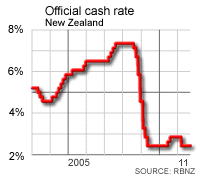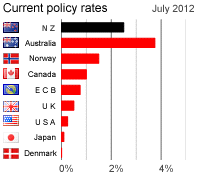 The Reserve Bank of New Zealand cut the Official Cash Rate (OCR) by 50 basis points to 3% on Thursday, but warned it would not be able to cut the OCR much more because New Zealand needed to keep rates higher than other countries to encourage foreigners to keep lending to us.
The cut was in line with market expectations for a 50 to 75 basis point cut, but was below the 100 basis point cut forecast by some economists.
Governor Alan Bollard said the economic outlook had deteriorated since the RBNZ's last rate cut of 150 bps to 3.5% in early December, largely because of a further slump in global demand. New Zealand's economy would contract through until the middle of this year before starting to recover through late 2009 and into 2010, he said.
Inflation was likely to drop to under 1% by the September quarter of this year before edging up to be around the middle of the 1-3% target band for the next few years, he said. Meanwhile, the Reserve Bank also forecast actual house prices would fall 20% from their peak in late 2007, which was a worsening of its December forecast for a 16% fall. Real house prices would fall 25%, it predicted.
"As economic activity troughs we expect the rapid easing of monetary policy to slow. Any future cuts will be much smaller than observed recently," Bollard said in the statement announcing the OCR cut.
"We do not expect to see in New Zealand the near-zero policy rates of some countries," he said.
"New Zealand needs to retain competitiveness in the international capital markets."
The Reserve Bank of New Zealand cut the Official Cash Rate (OCR) by 50 basis points to 3% on Thursday, but warned it would not be able to cut the OCR much more because New Zealand needed to keep rates higher than other countries to encourage foreigners to keep lending to us.
The cut was in line with market expectations for a 50 to 75 basis point cut, but was below the 100 basis point cut forecast by some economists.
Governor Alan Bollard said the economic outlook had deteriorated since the RBNZ's last rate cut of 150 bps to 3.5% in early December, largely because of a further slump in global demand. New Zealand's economy would contract through until the middle of this year before starting to recover through late 2009 and into 2010, he said.
Inflation was likely to drop to under 1% by the September quarter of this year before edging up to be around the middle of the 1-3% target band for the next few years, he said. Meanwhile, the Reserve Bank also forecast actual house prices would fall 20% from their peak in late 2007, which was a worsening of its December forecast for a 16% fall. Real house prices would fall 25%, it predicted.
"As economic activity troughs we expect the rapid easing of monetary policy to slow. Any future cuts will be much smaller than observed recently," Bollard said in the statement announcing the OCR cut.
"We do not expect to see in New Zealand the near-zero policy rates of some countries," he said.
"New Zealand needs to retain competitiveness in the international capital markets."
 Bollard said house price falls and increased precautionary saving by households was behind weak consumer spending. "Inflation pressure is abating rapidly as a result," Bollard said.
He also warned banks again for the third time they needed to pass on cuts in wholesale interest rates.
"While credit growth is easing in line with the weak economy, we expect financial institutions to continue lending on sound business propositions, to support the economy."
The large fiscal and monetary stimuli being pushed into the New Zealand economy, along with the lower New Zealand dollar, would help power a gradual recovery later this year and into next year.
"However, the scale of the global economic crisis is such that there is great uncertainty about future economic developments and there is a risk that the recovery may occur later and be more protracted than we anticipate," Bollard said.
Bollard said house price falls and increased precautionary saving by households was behind weak consumer spending. "Inflation pressure is abating rapidly as a result," Bollard said.
He also warned banks again for the third time they needed to pass on cuts in wholesale interest rates.
"While credit growth is easing in line with the weak economy, we expect financial institutions to continue lending on sound business propositions, to support the economy."
The large fiscal and monetary stimuli being pushed into the New Zealand economy, along with the lower New Zealand dollar, would help power a gradual recovery later this year and into next year.
"However, the scale of the global economic crisis is such that there is great uncertainty about future economic developments and there is a risk that the recovery may occur later and be more protracted than we anticipate," Bollard said.
RBNZ cuts 50 bps to 3%, but warns cannot cut much more
RBNZ cuts 50 bps to 3%, but warns cannot cut much more
12th Mar 09, 9:03am
by

We welcome your comments below. If you are not already registered, please register to comment
Remember we welcome robust, respectful and insightful debate. We don't welcome abusive or defamatory comments and will de-register those repeatedly making such comments. Our current comment policy is here.